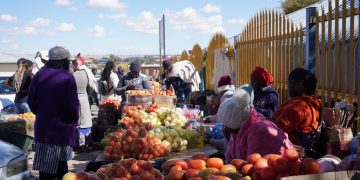
The country is eagerly waiting to hear what Finance minister Ipumbu Shiimi will present in the 2022-23 National Budget on Thursday, at a time Namibia’s economy is slowly recovering from the negative effects of the deadly coronavirus pandemic.
In an effort to understand options available to the minister on his economic recovery plan, The Brief reached out to economic experts on what should be prioritized.
Cirrus Capital’s Head of Research Robert McGregor said he expects the government to continue with fiscal consolidation, with focus on the personnel expenditure, where it has held off wage increases for civil servants.
“The key expectations are the Government’s commitment to fiscal consolidation, and what prioritization will be seen within the allocations to the votes. With limited fiscal room, the quality of Government’s spending needs clear attention. Furthermore, our government has been relatively well resourced historically, indicating that our challenges lie more within the quality and execution of spend, rather than in not collecting sufficient revenue,” he told The Brief.
“Focus will remain on the personnel expenditure forecasts, as this remains overwhelmingly the largest drain on the fiscus. Government has done well to hold off on wage adjustments for many years now, but its forecasts will provide an important signal as to its expectations over the medium term. In line with this, the Government has taken a hard line on the SOEs with active reductions in transfers – we hope to see a similar signal in its new forecasts. Interest payments are also a worryingly large part of expenditure.”
On the revenue side, McGregor said the biggest concern lies around the SACU payments to be received this year.
“Revenue has been surprisingly resilient. The biggest concern lies around the SACU payments to be received this year, given its T+2 cycle, as this (along with expenditure restraint) will determine the extent of the deficit. We expect SACU revenue for FY2023/24 and beyond should be revised upwards substantially, but it remains to be seen what the full impact is on this year’s allocation (FY2022/23). Given the collapse in revenue and slow rebound, fiscal discipline is essential to ensure the large deficits and domestic funding requirements do not further negatively impact the domestic economy,” he said.
With regards to policy, McGregor expects Shiimi to announce policy inceptives that will grow the country’s tax base through economic participation.
“We hope to see clear and short-term policy responses, but we are not holding our breath. Further details of the impending dividend tax are expected, although this will put a further dampener on the long-term health of the Namibian economy. The positive policy proposals (both small and major ones) appear to be uncertain and left to a much later date, such as considerations around reduction of the non-mining corporate tax rate. Policy should incentivize growing the tax base through more participation within the formal economy and better returns, not look to increasingly extract resources from the same (and possibly shrinking) base,” he said.
IJG Stockbroking ’s Danie van Wyk expects government’s operational expenditure to remain in line with previous estimates, despite pressure on the government to increase salaries by civil servant unions.
“The prior two budgets showed a decline in the expected interest rate on government debt over the Medium Term Expenditure Framework (MTEF) period. As the global economic recovery continues to gain momentum, and central banks gradually start the move towards monetary policy normalization, we would not be surprised to see the ministry revising interest costs upwards, particularly on the longer end of the MTEF period,” he said.
Van Wyk expects to see some upward revisions in revenue over the Medium-Term Expenditure Framework period, driven mostly by an increase in diamond royalties, non-mining tax revenue and SACU receipts with the economic environment having improved somewhat over the last year.
“Higher than expected revenue would be welcomed as it would place less pressure on the deficit, provided that the government managed to keep expenditure under control,” the IJG Research Analyst said, adding that Shiimi would do well to pronounce the government’s planned tax reforms.
“We expect the minister to give guidance on when the Income Tax Amendment Bill (which includes the proposed introduction of a 10% withholding tax on dividends) and the Value Added Tax Amendment Bill (which introduces a 15% VAT on management fees for listed asset managers) will be implemented as well as an update on the proposed lowering of the corporate tax rate,” he said.
PSG Namibia’s Shelly Louw expects the budget deficit to narrow in the 2022/23 fiscal year from a larger deficit of 8.7% of GDP in the previous fiscal year.
“We expect the budget deficit to narrow to 7% of GDP in the 2022/23 fiscal year from a larger deficit of 8.7% of GDP in the preceding fiscal year as the economic recovery gains traction relative to a very low base. We still foresee some moderate fiscal slippages in the medium term given the pressure from sharply lower customs union revenues, the slow pace of fiscal reforms and a propensity for wasteful expenditure as well as rising interest payments. Operational budget cuts and improved tax revenues in line with reduced Covid-19 measures and a recovery in world trade may assist in narrowing the budget deficit,” the PSG Analyst said.
Louw forecast the current account deficit to narrow from an estimated deficit of 7.6% of GDP in 2021 mainly to improved commodity exports and tourism earnings.
“The current account deficit widened to $441 million in Q3 2021 compared with a narrower deficit of $219 million in Q2 2021. The increase in goods imports, partly driven by the rise in the global oil price, has exposed the continued weakness in goods exports and net services compared with pre-pandemic levels. We forecast the current account deficit will narrow somewhat to 6.5% of GDP in 2022 from an estimated deficit of 7.6% of GDP in 2021, thanks mainly to improved commodity exports and tourism earnings.”













